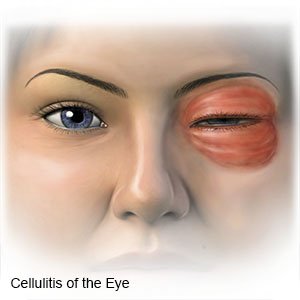Periorbital Cellulitis
Medically reviewed by Drugs.com. Last updated on May 6, 2024.
What is periorbital cellulitis?
Periorbital cellulitis, or preseptal cellulitis, is a bacterial infection of your eyelid or the skin around your eye. The infection can develop from a scratch or insect bite around the eye. Periorbital cellulitis may cause vision problems. It should be treated as soon as possible to prevent complications.
 |
What are the signs and symptoms of periorbital cellulitis?
Signs and symptoms are usually seen on one eye. You may have any of the following:
- Red, swollen eyelid
- An eyelid that feels warm and hard
- Pain or tenderness when the area is touched
- A fever
How is periorbital cellulitis diagnosed?
Your healthcare provider will examine your eye. He or she will test your eye movement and vision. You may need blood tests to show what kind of bacteria are causing your infection. Other tests may be needed to see if the infection has spread.
How is periorbital cellulitis treated?
If your periorbital cellulitis is severe, you may need IV antibiotics in the hospital. If the infection is not treated, it can spread through your body and become life-threatening. You may need any of the following medicines:
- Antibiotics help treat a bacterial infection.
- Acetaminophen decreases pain and fever. It is available without a doctor's order. Ask how much to take and how often to take it. Follow directions. Read the labels of all other medicines you are using to see if they also contain acetaminophen, or ask your doctor or pharmacist. Acetaminophen can cause liver damage if not taken correctly.
- NSAIDs , such as ibuprofen, help decrease swelling, pain, and fever. This medicine is available with or without a doctor's order. NSAIDs can cause stomach bleeding or kidney problems in certain people. If you take blood thinner medicine, always ask your healthcare provider if NSAIDs are safe for you. Always read the medicine label and follow directions.
How can I manage my symptoms?
- Wash the area with soap and water every day. Gently pat dry. Use bandages if directed by your healthcare provider.
- Do not rub or scratch your eyes. This can increase your risk for spreading the infection.
- Place a cool, damp cloth on the area. Use clean cloths and clean water. You can do this as often as you need to. Cool, damp cloths may help decrease pain.
- Wash your hands often. Use soap and water. Wash your hands after you use the bathroom, change a child's diapers, or sneeze. Wash your hands before you prepare or eat food. Use lotion to prevent dry, cracked skin.

How can an eye infection be prevented?
- Wear proper safety equipment. Protect your face from injury during sports and other activities.
- Keep wounds clean and dry. Clean wounds on the face with soap and water. Cover wounds with a dry bandage if needed.
When should I seek immediate care?
- You lose vision in your infected eye.
- You have vision problems, such as double vision.
- You have difficulty moving your eyeball.
- You cannot close your eye due to swelling.
- You develop a headache and are vomiting.
- You have a stiff neck.
- You see red streaks coming from the infected area.
When should I call my doctor?
- Your symptoms do not get better within 24 hours of treatment.
- The red, warm, swollen area gets larger.
- Your fever or pain does not go away or gets worse.
- You have questions or concerns about your condition or care.
Care Agreement
You have the right to help plan your care. Learn about your health condition and how it may be treated. Discuss treatment options with your healthcare providers to decide what care you want to receive. You always have the right to refuse treatment. The above information is an educational aid only. It is not intended as medical advice for individual conditions or treatments. Talk to your doctor, nurse or pharmacist before following any medical regimen to see if it is safe and effective for you.© Copyright Merative 2024 Information is for End User's use only and may not be sold, redistributed or otherwise used for commercial purposes.
Learn more about Periorbital Cellulitis
Treatment options
Care guides
Further information
Always consult your healthcare provider to ensure the information displayed on this page applies to your personal circumstances.
